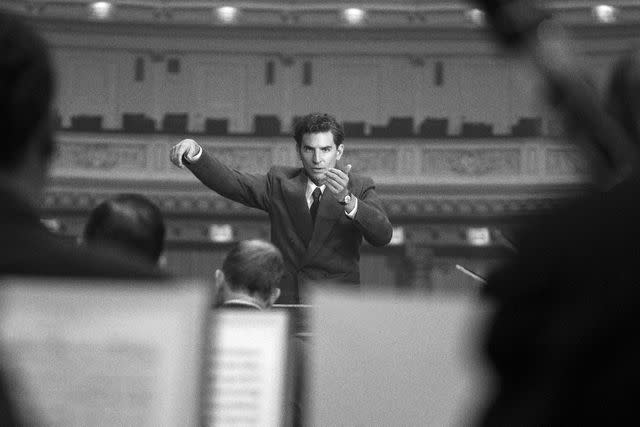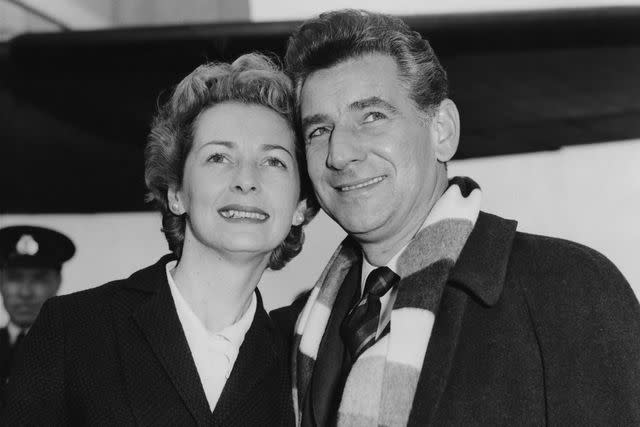“Maestro” PEOPLE Review: Bradley Cooper Directs and Stars in a Magnificent Movie About Leonard Bernstein
- Oops!Something went wrong.Please try again later.
- Oops!Something went wrong.Please try again later.
- Oops!Something went wrong.Please try again later.
- Oops!Something went wrong.Please try again later.
- Oops!Something went wrong.Please try again later.
A superb Carey Mulligan stars as Leonard Bernstein's wife, Felicia Montealegre

Jason McDonald/Netflix
Carrey Mulligan as Felicia Bernstein and Bradley Cooper as her celebrated husband, Leonard Bernstein.Early on in Maestro, director-star-cowriter Bradley Cooper’s vivid, restless film about another famous hyphenate — composer-conductor Leonard Bernstein— Carey Mulligan makes a gorgeous entrance as Felicia Montealegre, the woman who would become Bernstein’s wife.
She’s shot in lustrous black-and-white, stepping down from a bus and advancing toward the camera while Bernstein’s “Lonely Town: Pas de Deux” plays on the soundtrack. As she pauses in closeup with a look of anticipatory happiness, you want to know everything about this woman and her life.
Mulligan, with her crinkly, vulnerable prettiness, can make you feel that in an instant.
You also sense that whatever happiness does arrive for Felicia will fall short, perhaps far short, of that look of anticipation. She’s about to attend a party at the house of pianist Claudio Arrau, where one of the guests will be the ebullient young Bernstein, already hailed for his musical promise. They’ll fall in love and marry, but his bisexuality will threaten to drive them apart for decades.
Bernstein is played by Cooper with gusto, verve and wit. He races through a movie percolating with glamour, passion and sturm und drang, that form of romantic, emotional turmoil affecting mostly famous artists. His Bernstein is like a combination of Mozart and golden retriever, driven by a sloppy, almost slobbering overabundance of creative energy and love — for music, for men, for everything. He can be both endearing and, one gathers, annoying.
Yet Cooper’s best scene, surprisingly, is a very quiet one: Bernstein is overwhelmed by how much he’s sacrificed of himself trying to live as a married man, and breaks down while walking with a former love (Matt Bomer).
Related: The 10 Best Holiday Movies for Families, According to PEOPLE's Critic
This was an era when American classical music saw the rise of a number of gay composers: Aaron Copland, Gian Carl Menotti, Samuel Barber, Virgil Thompson. How did someone of Bernstein’s temperament ever hope to deal with the demands of heterosexual domesticity? (He referred to self-loathing with an anagram, elf's thread.)
A few words about Bernstein's nose. When photos from the film were released last year, there was some disapproval over Cooper’s large prosthetic proboscis. The problem with the fake nose turns out mostly to be that it’s just that, fake, although it’s certainly better than the parrot’s beak Nicole Kidman was given to play Virginia Woolf in The Hours. In closeup, it also occasionally makes Cooper look cross-eyed. Still, the actor's resemblance to Bernstein is often stunning.

Jason McDonald/Netflix
Bradley Cooper in "Maestro" (2023)Bernstein’s physical charisma is more elusive. We live in an age where conductors aren’t celebrities, and the word "maestro" invokes a Seinfeld joke as much as a title of respect in the concert hall. Bernstein, though, was a superstar. His electric presence, amplified by the glorious power of classical music, created an effect and a moment that have largely passed from our culture.
And what about Felicia? Mulligan, who doesn’t have to worry about playing a musical genius or impersonating someone the public scarcely knew, makes the most of a terrific part.
Felicia, who knows about Bernstein’s sexual inclinations from the start, spends years in a quietly seething rage as he pursues men and chases after greatness as a classical composer. An actress, Felicia is as theatrical a personality as Bernstein, except that she expresses herself with an air of cool dignity. Both of them are always on — you wonder how they ever produced a daughter as likably unaffected as Maya Hawke’s Jamie. It’s just that Bernstein is a volcano, and Felicia an earth tremor.

Jason McDonald/Netflix
Cooper as Bernstein conducting Mahler.But the film is ultimately a portrait of the fundamental devotion that somehow allowed them to survive as a couple. “I have loved her,” Bernstein wrote his sister in 1950, “despite all the blocks that have consistently impaired my loving-mechanism.”
Maestro establishes that from the start, minutes after Bernstein and Felicia have met. Cooper, whose first film as director was his highly satisfying reboot of A Star Is Born with Lady Gaga, creates a fantasy sequence that incorporates the lovers into the youthful, jubilant ballet of On the Town, for which Bernstein wrote the score.
Then, in another strangely magical moment, Cooper suggests how they’ve drifted apart: Felicia watches Bernstein from the wings — far, far off in the wings — while he conducts Mahler’s Fifth Symphony. She’s remote, detached, standing in an abstract lozenge of light that almost cocoons her.

Lee/Central Press/Hulton Archive/Getty
The real Bernstein with wife Felicia in 1959. They'd married in 1951.Maestro loses some of this dazzle — what you might call its brio — in the closing stretch, as Felicia becomes sick with terminal cancer. It dwindles down into something that's like Terms of Endearment played as an adagio.
And at times the film, roiling with Bernstein's larger-than-life hungers, can feel constrained by its narrative framework. What would Maestro have been like, you wonder, with less Felicia? In one long sequence that both exalts Bernstein yet somehow undermines him, we watch him conducting Mahler’s Resurrection Symphony. He's pouring his soul into the music. He's swept up in a transcendent moment. Then an aura of orange hair appears to the side: This turns out to be Felicia, watching in the audience.
For that moment, at least, couldn't Bernstein's love for Felicia be allowed to take a back seat to his love for Mahler? (He was buried with a copy of the score of Mahler's Fifth.)
Even so, the film is an exciting achievement for Cooper. In that same letter Bernstein wrote of how he'd dreamed the night before that he and Felicia had found peace together: "It was a hard dream, but full of richness.” Maestro captures that hard richness.
Maestro is in select theaters now, then streaming on Netflix Dec. 20.
For more People news, make sure to sign up for our newsletter!
Read the original article on People.

